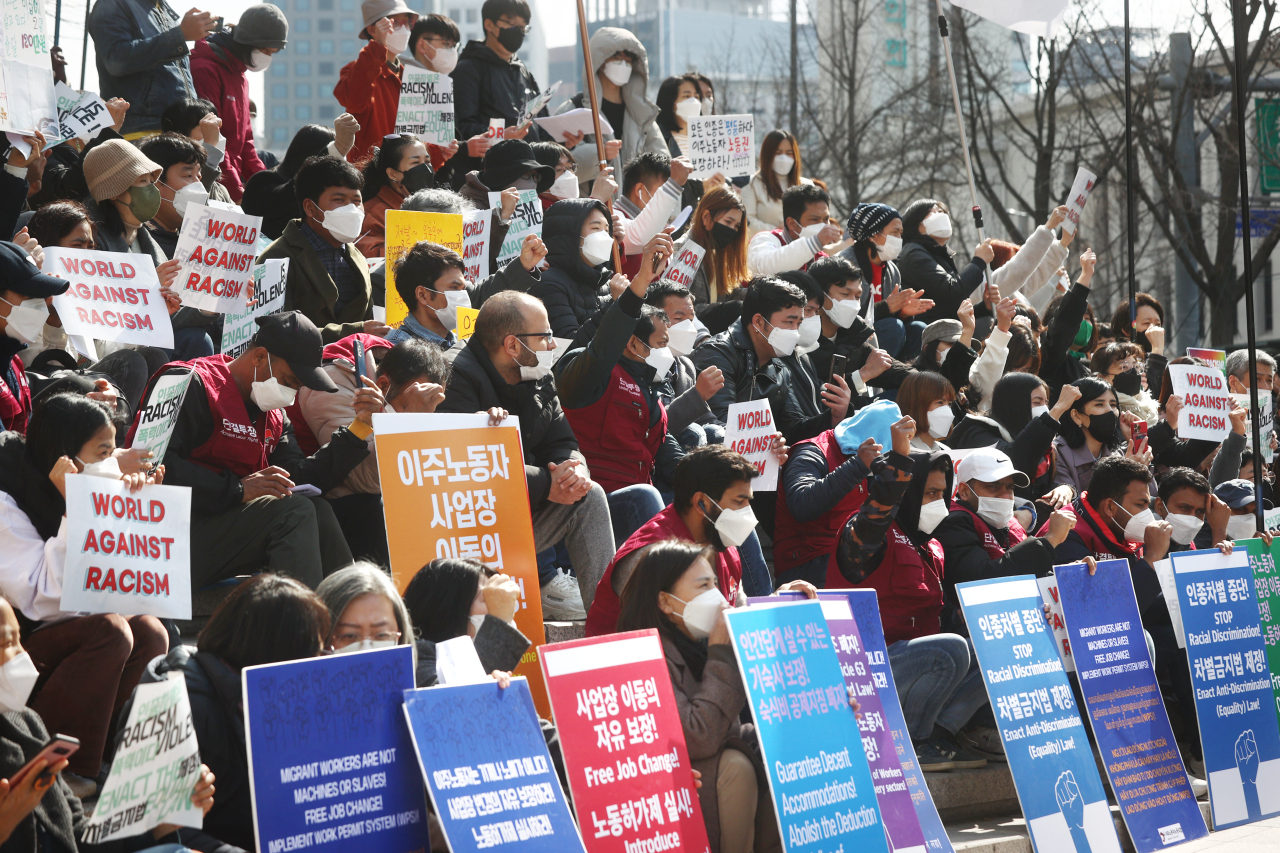 |
Immigrants and activists hold a protest, calling for an enactment of the anti-discrimination law, commemorating the International Day for the Elimination of Racial Discrimination in central Seoul, March 20. (Yonhap) |
The COVID-19 pandemic has had a negative impact on how receptive Koreans are to a multicultural society, a study by government-run think tank Korean Women’s Development Institute suggests.
The research, titled the Ministry of Gender Equality and Family’s 2021 Multicultural Acceptability Study, has been conducted every three years since 2012. This year, 5,000 adults aged between 19 and 74 and 5,000 middle and high school students were polled.
According to the survey, the adult respondents scored 52.27 points in their level of multicultural acceptability, 19.12 points lower than the 71.39 points of youths.
While the multicultural acceptability of adults has been continuing to decline, that of youths has been on an upward climb, marking the highest since the survey began a decade ago, the ministry said.
“We think the multicultural acceptability of youths is improving as youths show a higher participation rate for multicultural education and activities than adults,” Lee Jung-sim, head of Youth and Family Policy Office, said. “We plan to expand multicultural education for adults.”
The survey also showed younger age groups are more likely to show higher multicultural acceptability.
It also suggested that the COVID-19 pandemic has affected people’s multicultural acceptability, decreasing the number of opportunities of exchanges with immigrants.
Some 42.6 percent of those who answered that the Korean society has changed its perception on immigrants over the past three years, said the COVID-19 pandemic made the biggest impact.
“Those in their 20s and 30s showed a lower inclination to act as a global citizen and the willingness to interact. This shows the lack of desire to associate with different cultures. We think this could be the impact of COVID-19,” Lee said.
The figure of both youths and adults who answered they have not seen immigrants in their daily lives doubled, compared to the previous survey in 2018.
The ministry explained that frequent encounters with immigrants in everyday life can lead to a higher multicultural acceptability.
The Gender Ministry said it plans to review its related policies based on the data from the research and draw up measures that can increase the multicultural acceptability of the people.
“It means a lot that the multicultural understanding education has been positively affecting the multicultural acceptability of the people,” Minister Chung Young-ai, said.
“We will work on increasing the multicultural acceptability of the people, strengthening the education by age groups and expanding the opportunities for exchange and communication,” Chung said.
By Im Eun-byel (
silverstar@heraldcorp.com)




![[Herald Interview] 'Trump will use tariffs as first line of defense for American manufacturing'](http://res.heraldm.com/phpwas/restmb_idxmake.php?idx=644&simg=/content/image/2024/11/26/20241126050017_0.jpg)

![[Health and care] Getting cancer young: Why cancer isn’t just an older person’s battle](http://res.heraldm.com/phpwas/restmb_idxmake.php?idx=644&simg=/content/image/2024/11/26/20241126050043_0.jpg)

